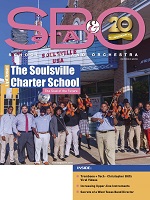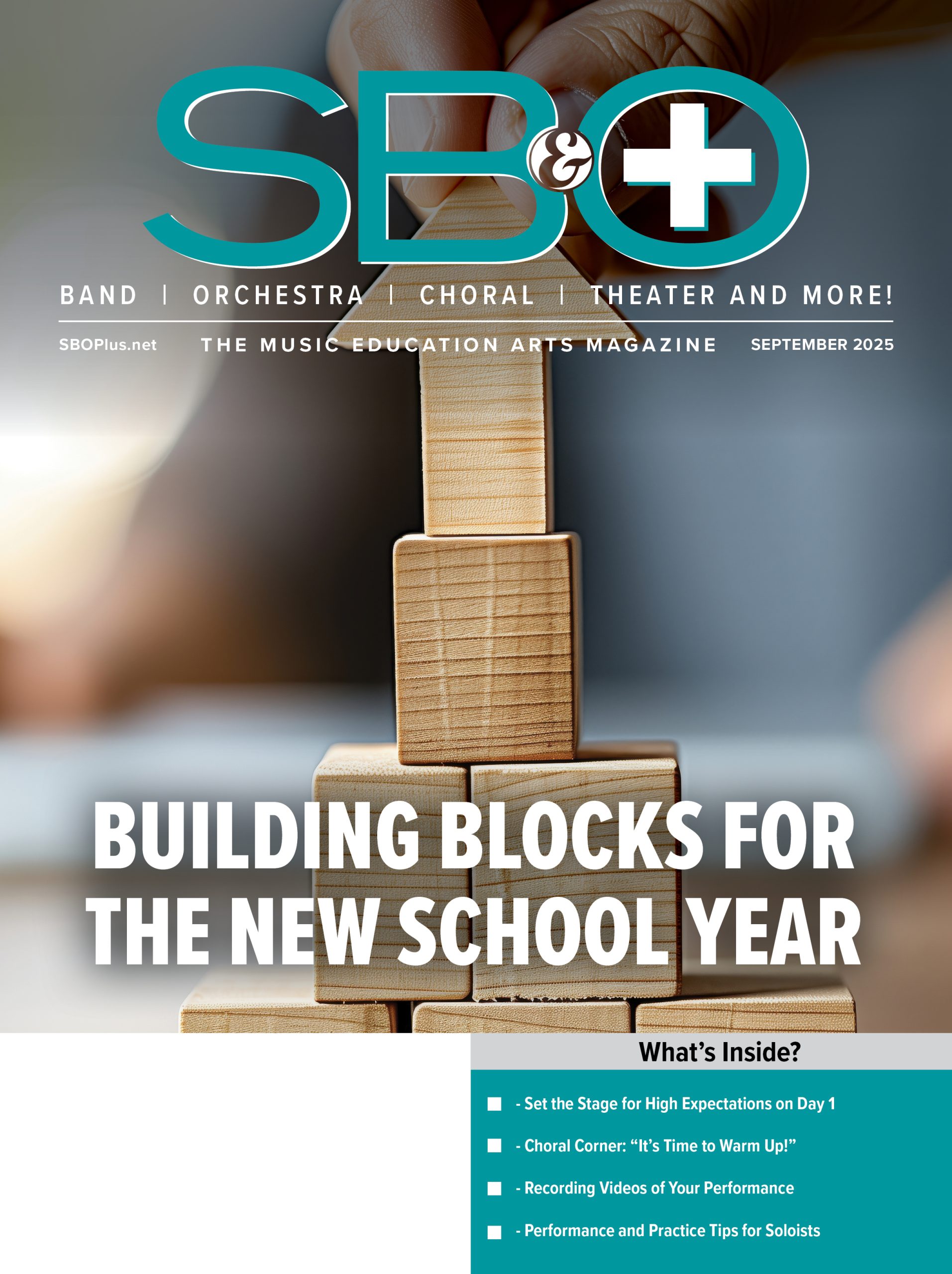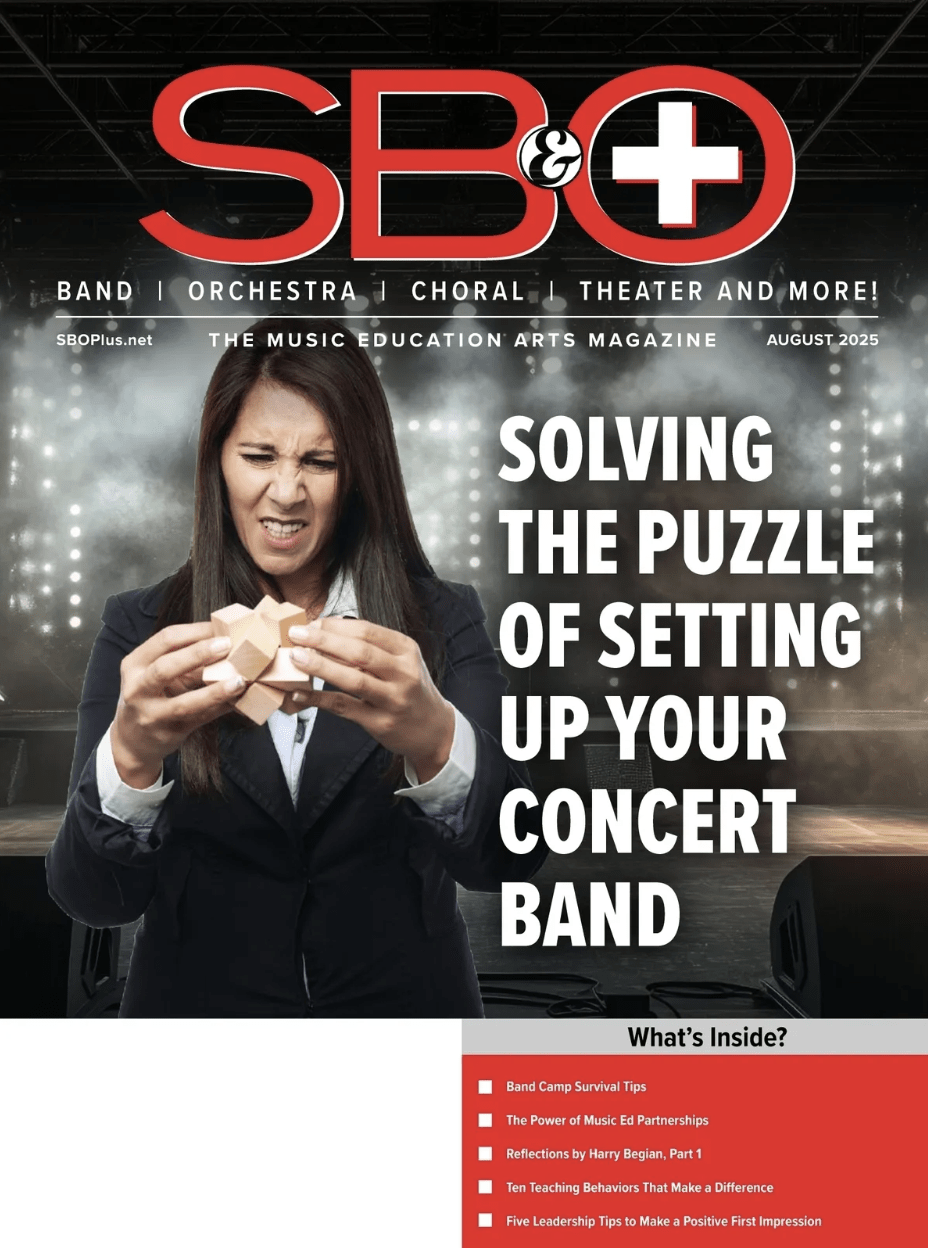Have you ever premiered a work written especially for your performing group? Or have you thought about engaging a composer to work with your students and perhaps conduct a piece in concert? If you have, I trust it was a valuable experience for all involved. If you have yet to enter these waters, I encourage you to dive right in. To make this happen is easier than you might imagine, and the benefits are many.
But you might ask, “Won’t this take away too much time from preparing for competition and concerts?” Experience has shown that through careful planning and advance discussions with the composer, you can have ample time for your regular performance preparation while providing your students with the thrill and learning opportunities afforded by interacting with a living composer.
Large and small ensembles at all levels can benefit from connecting with a composer. By working with a composer, students can gain valuable insight into how a piece is constructed and learn about the composer’s sources for ideas. Through question-and-answer sessions with the composer, students can learn about the processes of instrumentation and orchestration, along with uses of rhythm, melody and harmony. Students also benefit from learning what the composer was thinking when writing various passages. For instance, I worked with one band as the guest composer and told the students that I had constructed the work by thinking of a story, and that I had used that technique to hold the structure of the work together. The group then demonstrated a deeper understanding of the form of the work and gave an outstanding, mature performance.
Finding a Composer
Who will compose a piece for your ensemble and where can you find such a person? A good way to start connecting with a composer is by contacting someone you know or someone who is close by. For example, you might find that a fellow music teacher or someone in your community has composed works and would be honored to write for your group. It might be that a local college faculty member would welcome the chance to compose a piece. Above all, don’t forget student composers. A talented high school student or a former student who is now a college composition major might offer an exciting new composition that your ensemble would enjoy learning. If a prospective composer is unsure about becoming involved, I suggest that you invite the person to listen to your group rehearse and then consider the possibility of writing something for the ensemble. I recently did just that with the head of our college composition faculty who, at my invitation, listened to my college band rehearse. As a result, he became inspired to compose something for the group and thought up several themes for the composition that very evening.
Once you have experienced successful performances with these composers who are close to home, you might want to expand the project and contact other composers further afield. Some regions have composers’ societies or composers’ alliances whose members are always looking to have their works performed. A Web site check would be a good place to start to find these groups.
Ensuring a Successful Composition
If this is your first time considering such a move, I suggest that you help ensure success by placing limits on the proposed new work. The piece need not be long or complex. Even something as short as a fanfare or brief march composed for the opening of the spring concert could serve as a good starting point for programming new works.
As to the type of work that will be composed, you won’t dictate what should be written, but certainly you will want a piece that students will relate to and benefit from and which will match their achievement levels. To help in this area, discuss the proposed project with the composer and ask what style the person writes in. Ask to see or hear examples of pieces written by the composer. Also ask if the person’s style would be accessible to school students and a parent audience. The discussion can help greatly in determining whether the proposed piece will be something that can be understood and performed well by your group.
If at all possible, have the composer attend a few rehearsals to get to know the capabilities and instrumentation of your ensemble. You should also discuss frankly the strengths and weaknesses of the group so the resulting composition will emphasize the ensemble’s strengths. As the old adage goes, “Let’s not show them what we can’t do!” This is one advantage of having a work tailor-made for your ensemble. I composed one piece for a large, excellent seventh-grade band that had full instrumentation; however, the trombone section was not up to the level of the rest of the band. So I wrote a substantial work that challenged everyone according to his or her achievement level. The trombones were challenged but were not given parts over their heads. The concert was a success and the band played to a standing ovation.
Engaging the Composer
As you think about engaging a composer, there are various types of approaches to consider. A common approach features a single performance with the composer attending a rehearsal or two before writing the piece, and then attending a few rehearsals before the concert to make any changes or offer performance suggestions. Then there is the possibility of extending the above arrangement by adding workshops in which the composer will actively work with the ensemble to explain the piece and engage in question-and-answer sessions with the students. For example, in one school, I used these additional workshops to help the band understand how to perform a portion of my piece that contained improvisation.
Further enrich your composer connection by having the composer conduct his own work. This approach is particularly valuable as it provides students with a very special inside look at a work, along with the exciting opportunity to play a world premiere under the baton of a composer.
If funds are available, a composer residency is a further possibility. Usually some sort of grant must be obtained in order to pay for this. Having a composer-in-residence can provide rewarding opportunities for students across the district over an extended period of time.
With any of these approaches, be sure to plan a little extra rehearsal time to allow for any notational errors to be corrected and, if parts are hand-written, to give time for students to get used to reading manuscript.
Paying the Composer
What is expected in the way of remuneration for such a project? It really depends on the individual. Payment arrangements with a composer could be as simple as an agreement to provide a high quality recording of the performance and funds to cover photocopying and travel costs, or a composer might want a larger payment for creating a commissioned work for your group. To cover these types of remuneration, support groups such as your music booster club or PTA might be willing to provide the funds. For larger amounts, you may need to explore the possibility of obtaining grants from foundations, arts in education groups, or from local, county or state agencies. The Internet can be a valuable source for tracking down these groups. Don’t let a lack of funds stand in your way. I urge you to get started down this road by beginning modestly perhaps with a short piece written by a fellow teacher or student. The important thing is to get your students involved in the exciting venture of giving a first performance of a work written by a living composer with whom your group can interact.
Promoting the Premiere
As you prepare for the premiere, be sure to crank up the publicity. Turn it into an event that will help boost your music program. Send press releases to local media outlets well in advance of the event. Include photographs of your group working on the new piece. Send photos of the composer and, if possible, the composer working with the students. Also pump up the publicity within the school district by sending special invitations to school board members, building and district administration, and other school officials. Invite area politicians to the event and request a special citation to be presented by them to the district on the occasion of this auspicious world premiere performance. This could be the photo-op they’re looking for. At the end of the performance, you could present a framed copy of the program to the composer which has been signed by your whole group. After the performance, don’t forget to send another press release with photographs to the newspapers as well as thank-you letters to the parent groups which have helped secure funds for the project.
In all, this should be a night to remember for your students and your performing ensemble program. Experience has shown that working with a composer can provide lasting, meaningful educational experiences for your students. The parents love it, the students feel special, and it is wonderful PR for your program: all provided by connecting with a composer.
Alfred S. Townsend has been conducting bands on Long Island, N.Y., for more than 30 years. During this time, he directed middle and high school concert, marching and jazz bands, and served for many years as District Director of Music and Art in the Baldwin, N.Y., public schools. He was also music director and principal conductor of the Bay Area Symphony Orchestra with performances on Long Island and in New York City. Currently, Dr. Townsend is professor of music and conductor of the Five Towns College Concert Band, Dix Hills, Long Island, N.Y., where he is director of music education and graduate music studies. He remains active as a composer of band and choral works and conductor of regional festival bands.



























